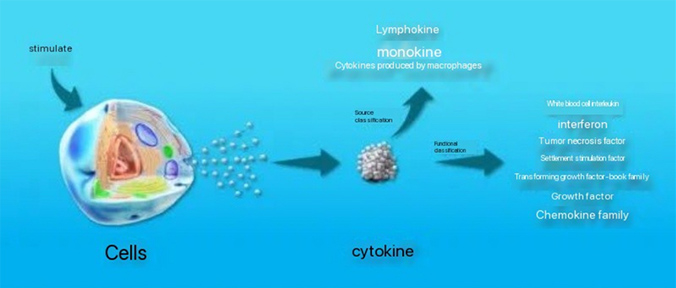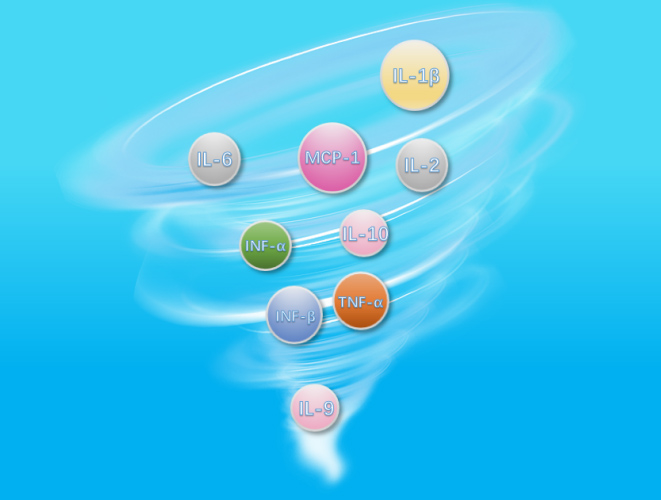

Cytokine Overview
I. Introduction
Cytokine (CK) is a kind of small molecule opal with a wide range of biological activities. It is synthesized and secreted by immune cells (such as monocytes, macrophages, T cells, B cells, NK cells, etc.) and some non-immune cells (endothelial cells, epidermal cells, fibroblasts, etc.) after stimulation. Cytokines bind to their target cells through receptors on the cell surface, The type of action in the body can be divided into autocrine, paracrine and endocrinology. It has the functions of regulating innate and acquired immune system, repairing damaged tissue, mediating inflammatory response, multipotential stem cell (MSC) (APSC Pluripotent cells), cell growth, blood cell production, and other functions.

Cytokine production and classification
Depending on the source, cytokines can be divided into:
1) Lyphokine, produced by lymphocytes (B, T and NK cells), such as IL-2, IFN-γ, GM-CSF and neurowhite blood cells.
2) Monokine (Monokine), produced by monocytes or Giant Carcharids, such as IL-1, TNF-α, G-CSF and M-CSF, etc.
3) The fine cell factors produced by Carcharias cells are produced by vascular endothelial cells, stromal cells and other cells in the bone marrow and thymus, such as IL-7, SCF, IFN-β, etc.
According to function, cytokines can be divided into:
1) Interleukin (IL), a cytokine produced by monocytes, lymphocytes, or other non-monocytes, plays an important regulatory role in immunomodulation, cell-cell interaction, hematopoiesis, and inflammation.
2) Interferon (IFN) can be divided into IFN-α produced by white blood cells, IFN-β produced by fibroblasts and IFN-γ produced by activated T cells.
3) tumor necrosis factor (tumor necrosis factor, TNF), the factor can cause tumor tissue necrosis, according to its source and structure are different, can be divided into single nuclear- There are two types of TNF-α produced by Carcharias cells and TNF-β produced by activated T cells.
4) Colony stimulating factor (CSF), CSF can not only stimulate the differentiation of hematopoietic stem cells at different developmental stages, but also promote the function of mature cells. According to the formation of different cell colonies, it is mainly divided into G (granulocyte) -CSF, M (macrophage) -CSF and GM (granulocyte, macrophage) -CSF, Multi-CSF (IL-3), SCF, EPO, etc.
5) Transforming growth factor-β family (TGF-β family), including the following (TGF-β1, TGF-β2, TGF-β3, TGFβ1β2, etc.).
6) Growth factor, including epidermal growth factor (EGF), fibroblast growth factor (FGF), tumor suppressor M (OSM), IGF-II, leukaemia suppressor (LIF)), nerve growth factor (NGF), etc.
7) Chemokinefamily, including C-X-C / α subfamily, C-C / β subfamily, C-type subfamily, CX3C subfamily, etc.
II. Cytokine Storm
Cytokine storm is a phenomenon in which a variety of cytokines (such as interleukin, chemokine, etc.) are produced rapidly and massively in body fluid caused by severe stimulation of white blood cell (such as infection of microorganisms, etc.)
As the immune system fights the causative agent, cytokines direct immune cells to the site of infection. At the same time, cytokines also activate these immune cells, and the activated immune cells produce more cytokines. Normally, the human body checks and controls this feedback loop. But in some cases, things get out of hand, resulting in too many activated immune cells in one place. The exact cause is not fully understood, but there is speculation that the immune system overreacts to new, highly pathogenic causative agents. Cytokine storms can cause severe damage to body tissues and organs. When they occur in the lungs, for example, excess immune cells and tissue fluid can accumulate in the lungs, blocking air in and out, and leading to death.

Cytokine storm
III. Detection
Cytokines actively participate in the immune response and inflammatory response of the body, which is a very sensitive inflammatory index. By dynamically monitoring the changes of cytokine levels during the development of the disease, the tendency of the disease to become serious can be found in time, so as to avoid or reduce the risk of deterioration of the disease, and improve the efficiency of clinical treatment. Moreover, the content and distribution of cytokines are one of the important indicators in biomedical research. Therefore, the detection of cytokines has very important clinical and research significance.
Enzyme linked immunosorbent assay (ELISA) is a comprehensive technique which combines the immune reaction of antigen and antibody with the catalytic reaction of enzyme. It has strong specificity, high sensitivity, simple operation, high detection efficiency, so it is widely used in the detection of cytokines, antibodies, antigens, proteins, hormones, harmful substances in food, environmental pollutants, food additives and toxins and other substances.
Related Product Recommendations
| Cat.No. | Product Name | Species |
| ELK1396 | Rat TNFa(Tumor Necrosis Factor Alpha) ELISA Kit | Rat |
| ELK1387 | Mouse TNFa(Tumor Necrosis Factor Alpha) ELISA Kit | Mouse |
| ELK1395 | Mouse TNFa(Tumor Necrosis Factor Alpha) ELISA Kit | Mouse |
| ELK1190 | Human TNFa(Tumor Necrosis Factor Alpha) ELISA Kit | Human |
| ELK1270 | Human IL1b(Interleukin 1 Beta) ELISA Kit | Human |
| ELK1272 | Rat IL1b(Interleukin 1 Beta) ELISA Kit | Rat |
| ELK1271 | Mouse IL1b(Interleukin 1 Beta) ELISA Kit | Mouse |
| ELK1158 | Rat IL6(Interleukin 6) ELISA Kit | Rat |
| ELK1157 | Mouse IL6(Interleukin 6) ELISA Kit | Mouse |
| ELK1156 | Human IL6(Interleukin 6) ELISA Kit | Human |
| ELK1142 | Human IL10(Interleukin 10) ELISA Kit | Human |
| ELK1143 | Mouse IL10(Interleukin 10) ELISA Kit | Mouse |
| ELK1144 | Rat IL10(Interleukin 10) ELISA Kit | Rat |
| ELK1036 | Human IFNg(Interferon Gamma) ELISA Kit | Human |
| ELK1132 | Mouse IFNg(Interferon Gamma) ELISA Kit | Mouse |
| ELK1133 | Rat IFNg(Interferon Gamma) ELISA Kit | Rat |
| ELK1142 | Human IL10(Interleukin 10) ELISA Kit | Human |
| ELK1143 | Mouse IL10(Interleukin 10) ELISA Kit | Mouse |
| ELK1144 | Rat IL10(Interleukin 10) ELISA Kit | Rat |
| ELK1028 | Human GMCSF(Colony Stimulating Factor 2, Granulocyte Macrophage) ELISA Kit | Human |
| ELK1029 | Mouse GMCSF(Colony Stimulating Factor 2, Granulocyte Macrophage) ELISA Kit | Mouse |
| ELK1030 | Rat GMCSF(Colony Stimulating Factor 2, Granulocyte Macrophage) ELISA Kit | Rat |
Unlocking the Power of Cytokines: The Key to Immunity, Healing, and Beyond
In today's rapidly evolving world of biotechnology, cytokines are emerging as powerful molecular messengers with diverse biological activities. Derived from immune cells and beyond, cytokines play a crucial role in regulating our body's innate and acquired immune system, repairing damaged tissue, and mediating inflammatory responses.
What are Cytokines?
Cytokines are small molecular proteins that are secreted by various cells in our body, including immune cells like monocytes, macrophages, T cells, and non-immune cells like endothelial cells and fibroblasts. They bind to receptors on target cells, triggering a wide range of biological effects.
Cytokine Classification
Cytokines can be broadly classified based on their source and function. From lyphokines produced by lymphocytes to monokines secreted by monocytes, each type of cytokine has its unique role in maintaining homeostasis.
Functions of Cytokines
Immunomodulation: Cytokines regulate the immune response, helping our body fight infections and diseases.
Tissue Repair: They play a vital role in healing damaged tissue, promoting wound healing and regeneration.
Inflammation Mediation: Cytokines are involved in mediating the inflammatory response, ensuring a balanced immune response.
Learn More
To dive deeper into the fascinating world of cytokines, I've attached a comprehensive document [Technology Share.docx](
The Future of Cytokines
With ongoing research and advancements in biotechnology, cytokines are poised to revolutionize the field of immunology, regenerative medicine, and beyond. Stay tuned for more exciting developments in this fascinating area of science!
Join the Discussion
I'd love to hear your thoughts on cytokines and their potential applications. Share your insights and questions in the comments below. Let's collaborate and unlock the power of cytokines together!
#cytokines #immunology #biotechnology #research #health #science


